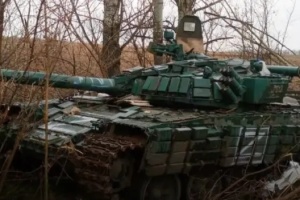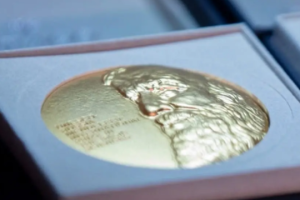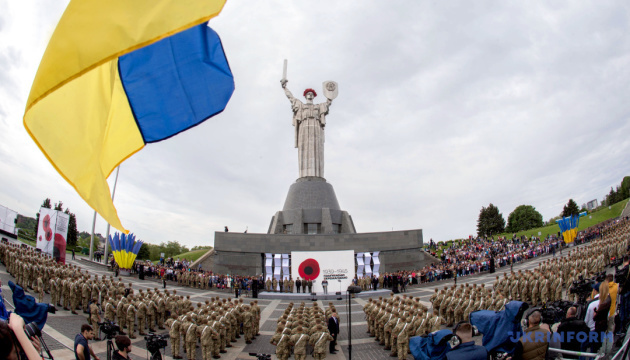
Victory Day. A common holiday that divides
It has been 78 years since the end of the bloodiest war in human history, but there are still discussions not only about the causes, course, and consequences of World War II, but also about what day and how exactly the victory over Nazism should be celebrated. Six Russian regions, the temporarily occupied Crimea, and a total of 21 cities in Russia have canceled Victory Day celebrations for security reasons. Perhaps Ukraine should also cancel the celebration of Victory Day on May 9, leaving the date of May 8, when the Victory is celebrated throughout the civilized world, at least for the same security reasons, but mental and ideological.
The Second World War. Nazism surrendered, but questions remain
Every state and every nation that participated in that long-ago war or was a neutral observer has its own view of those times. Some took part in the war on the side of Nazi Germany or acted as its sympathizers, some fought on the side of the anti-Hitler coalition or joined it in the last months or even days preceding the Victory. Some, like the Soviet Union, were initially Hitler's allies and then became the target of his attack. History textbooks and dry encyclopedia articles cannot convey the tension of those times, nor the confusion of the world in the face of the invasion of the Nazi anti-civilization, which had captured almost all of Europe and was one step away from defeating the democratic world.
It was a bitter irony that in the deadly confrontation between the civilized world and the bestial ideology and practice of Nazism, another hypostasis of evil, the anti-civilization of communism, was on the side of good. Scholars have researched in detail and written hundreds of books about the similarities between the ideologies of National Socialism and Communism, the identity of their practices of extermination of people and their ideological, class, or national characteristics. The most important question-how it could have happened that in the twentieth century Europe and Asia returned to the times of savagery and turned away from humanism-has not received a reasonable answer.
How did the German people, who were undoubtedly one of the bearers of modern civilization, a people of great culture, literature, music, science, and painting, suddenly turn into a horde of barbarians in a few years? Why did so many European countries become imbued with the ideas of fascism and revanchism to the point where they not only became accomplices of the German Nazis but sometimes surpassed their ideological allies in hatred and cruelty? The most inexplicable thing about the short but terrible history of Nazi and fascist rule in Europe is that many representatives of those peoples who were considered by Nazi ideologues to be imperfect and destined for extermination or forced assimilation became allies of those who tried to destroy them.
The history of the celebration of the victory over Nazism in the USSR and post-Soviet states is closely linked to the ideological constructs that were diligently imposed by the ideological apparatus of the communist system. In order to avoid uncomfortable questions about the alliance with Hitler and the August 1939 agreement with Nazi Germany to divide Europe, a separate "war within a war" was invented, the Great Patriotic War of the Soviet people against Nazi Germany, which was supposedly separate from World War II.
The merits of the allies of the anti-Hitler coalition were denigrated in every possible way. In particular, a false legend was created about the alleged deliberate delay by the Allies, the United Kingdom and the United States, in opening the so-called second front in western Europe. In fact, the second front was the line of contact between the USSR and Germany. Great Britain entered the war with Germany from the moment Hitler and Stalin attacked Poland and did not stop the confrontation with Nazism until the moment of victory - late in the evening of May 8, 1945.
Allies, the "second front," and Soviet lies
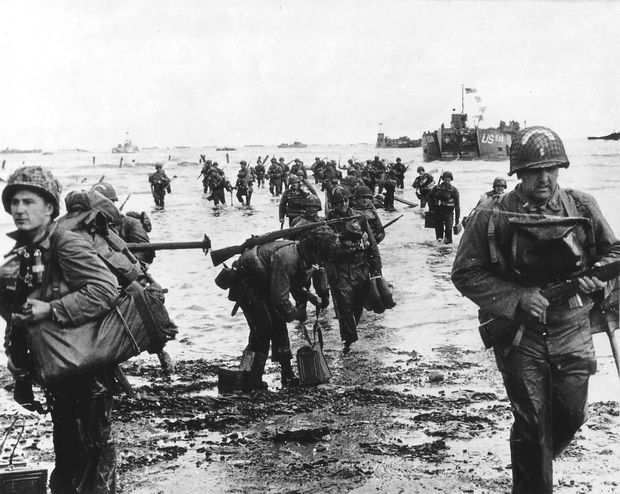
Soviet military and party historians lied about the fact that the second front began with the Normandy landings on June 2, 1944. In fact, the British had been fighting undisputedly with German and Italian troops since the beginning of World War II, and the first massive military operation in Europe began with the landings in Sicily on July 9, 1943. Then, on August 17, the resistance of German and Italian troops was overcome, and the Italian dictator Mussolini was removed from power and arrested.
On September 3, 1943, the Italian Allied operation began with an amphibious landing in Calabria, and on September 8, Italy surrendered to the Allies, and Germany had to transfer troops from France and the Eastern Front to hold part of the Italian territory. Similarly, Soviet historians kept silent about the brilliant Allied operations of 1942 in North Africa, where the armies of Italian Marshal Graziani and German Field Marshal Rommel were defeated. British and American troops liberated the territories of modern Morocco, Algeria, Libya, and Tunisia.
The story of the "designation" of May 9 as the day of victory over Nazi Germany is also part of the Soviet communists' attempt to isolate and elevate the role of the Soviet Union in the world's common struggle against Nazism. Germany's surrender to the Allies was signed on May 7, with Major General Susloparov as the Soviet representative. However, Stalin was not satisfied with the format and level of Soviet representation, so the Allies held another ceremony of signing the German surrender on the evening of May 8, where Marshal Zhukov performed in all the glory and glitter of his orders. The whole world was already celebrating the victory, and the USSR was waiting for the production to be completed, according to the Soviet leader's whim.
The subsequent events surrounding this holiday in the USSR and post-Soviet Russia were directly related to the fact that neither the Soviet nor the Russian authorities had anything to present to their people as a real achievement, except for the victory in that really bloody and really great war. The realization that communism will not be built, and that the achievements of real socialism seem outstanding only if they cannot be compared to the achievements of Western civilization, have led to the exceptional importance of this holiday for the USSR and modern Russia.
If there is no reason to be proud of the present, one can only be proud of the distant past. The sacralization of the holiday of the victory over Nazism, Russian chauvinistic fervor, and the exaltation of the allegedly exceptional merits of Russians in the victory over Hitlerism have become perhaps the only modern "staple" of Russia and the ideological construct that can theoretically unite dozens of peoples forcibly gathered in the Russian Federation, who are called the clumsy term "Russians."
Ukrainian view of the war
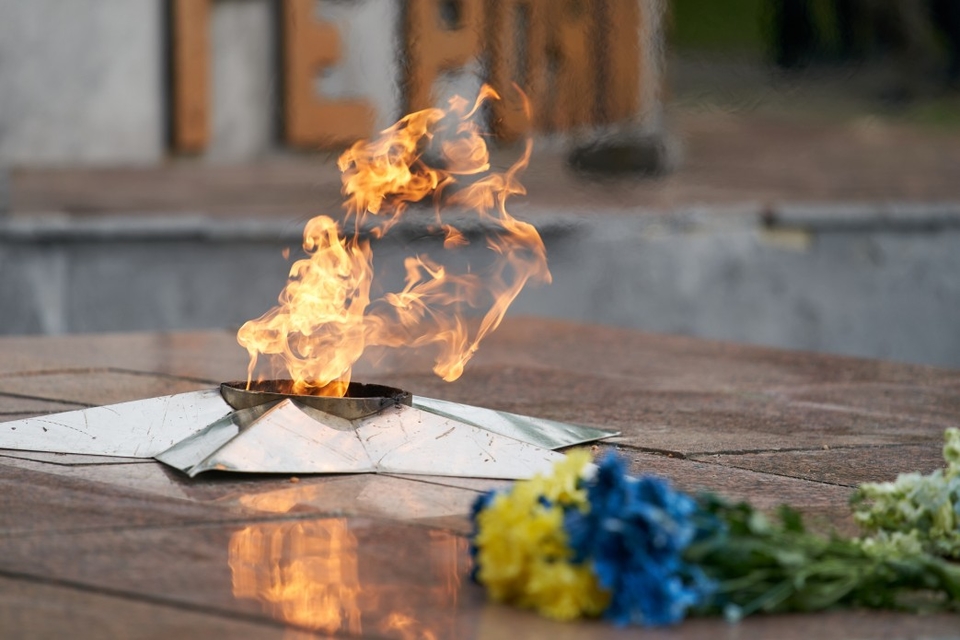
In the public consciousness of Ukrainians, the attitude to the Victory over Nazism Day changed long before the Russian armed invasion. First and foremost, we reject the Russian attempt to appropriate this holiday and take sole credit for the victory over Nazism. Ukraine, unlike Russia, was completely occupied during Hitler's aggression, and Stalin's generals failed miserably in all the battles of 1941, drove their armies into cauldrons and left civilians to be slaughtered by the Nazis.
The twenty years of Soviet rule in Ukraine, after the violent liquidation of Ukrainian statehood, left behind the memory of the Holodomor and mass repression. The retreating Red Army and the NKVD left behind blown-up cities and the bodies of "enemies of the people" hastily executed in prisons. The fate of the Jewish and Roma populations is separate, but not separated from the general war misery in Ukraine. The Soviet authorities, having intelligence about the pogroms and mass shootings of Jews and Roma by the Nazis, did nothing to ensure the evacuation of their fellow citizens, who were threatened with physical destruction.
The liberation of the territory of Ukraine in 1943-44 was accompanied not only by a new wave of repression against the population that had been left to the mercy of the German Nazis and their Slovak, Hungarian, and Romanian allies two years earlier. To this day, Ukrainian families still tell sad stories about the blacks who were mobilized into the Red Army and thrown into battle not only without changing into military uniforms, but sometimes without weapons.
Many Ukrainians took part in the partisan movement that was not pro-Soviet, such as the Polissya Sich, OUN, and UPA units. For decades, these people were erased from the book of anti-Nazi resistance, accused of collaboration with the occupiers and fascism, despite the obvious facts that the nationalist movement in Ukraine during World War II went through a rethinking of its ideological foundations and armed resistance to both the Nazi and Soviet occupiers.
Victory Day will be a holiday of expulsion of Russian invaders
The descendants of real, not carnival, front-line soldiers remember well that their grandfathers preferred not to remember the war, sitting gloomily at their holiday tables. They never thought of turning the day the war ended into a show or masquerade. This attitude was passed on to their children and grandchildren, and in general, the traditions of the Ukrainian people do not allow for artificial joy inspired by the authorities over events that cause only sadness, grief, and unwillingness to repeat.
On May 8, we will celebrate the Day of Remembrance and Reconciliation, remembering the victims of World War II, together with all the peoples of the anti-Hitler coalition and their then-opponents, who rethought the consequences of that war, drew the proper conclusions and became sane nations and countries. The next day, on May 9, when we celebrate the day of the victory over Nazism, according to a tradition not ours but established by us, we will remember those who died then and mourn for those who died now.
It turned out that Nazism has not been completely defeated, but now the avatars of the Nazis of seventy-eight years ago, wearing the uniform of the Russian armed forces, are killing, raping, and destroying. Everything that Russian hands touch strangely turns into ruins or acquires inappropriate, blasphemous features. The Russians turned the Victory Day into a day of defeatism, transcribed the words "never again" into "we can do it again," and called their wars of aggression and genocide denazification.
The ongoing war with Russia requires a rethinking of many historical events and memorable dates. The common victory day with the aggressor is one of those phenomena that needs not only to be rethought, but also to be given a new interpretation. Despite all the significance of the long-standing victory over Nazism, our most important victory holiday is still ahead. It will be the day when Russia's defeat ends the Russian-Ukrainian war.
Dmytro Redko, Kyiv
P.S.
May 9 is now Europe Day in Ukraine
President of Ukraine Volodymyr Zelensky has signed a decree according to which Ukraine will now celebrate Europe Day on May 9.
The relevant document No. 266/2023 was published on the President's website.
"Aware of the European identity of the Ukrainian people, in order to strengthen the unity of the peoples of Europe, ensure peace, security and stability on the European continent, testify to the ideals and values of democracy, support the initiatives of youth and other public associations, I decide to establish Europe Day in Ukraine, which will be celebrated annually on May 9 together with the states of the European Union," the decree says.
This document also provides for the repeal of the previous Presidential Decree of April 19, 2003, No. 339/2003 "On Europe Day," which was celebrated in Ukraine every year on the third Sunday of May.

